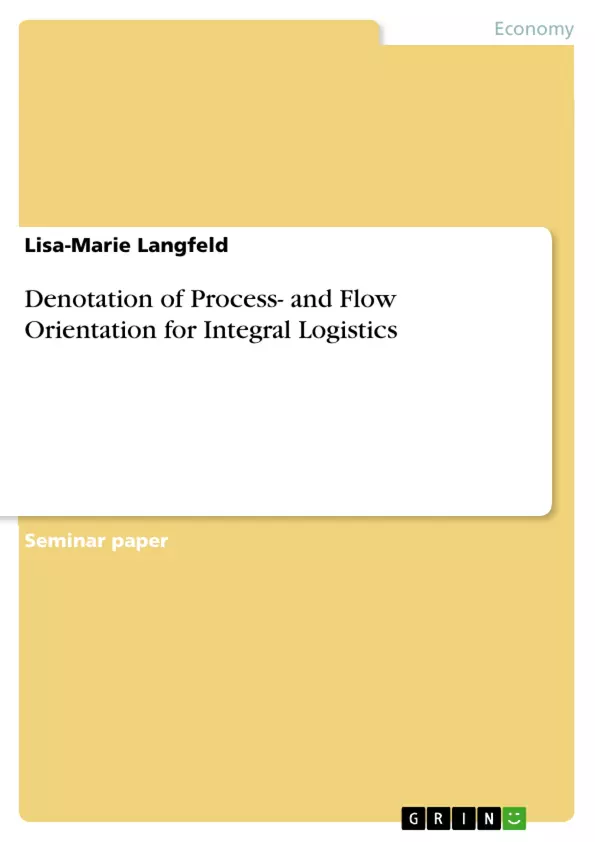According to Schönsleben “The link between process management and logistics management is evident” (2007). In order to be able to agree to Mr. Schönsleben, the thesis on hand focuses on processes and flows involved in integral logistics. In this context, touching supply chain management is indispensable. The author also wants to sensibilise the reader for recognizing the omnipresence of processes and accompanying flows in daily operations and their increasing significance for business success.
Questions answered during the following elaborations concern the development from logistics to integrated means, the existence of different process types and how to design the same. Additionally, process implementation and the position of a chief process officer are discussed. The paper also tries to point out reasons for the status quo of process handling within companies.
Demonstrating the current relevance of the given topic, the results are mainly based on literature originating from the previous 15 years plus contemporary sources available via Internet. A study conducted by PricewaterhouseCoopers dealing with business processes also influenced the findings.
Complexity of business models and widely-branched supply chains long for a sophisticated organisational effort. Nearly every part of an integral logistics chain is related to a process and IT-support is inalienable for handling them. Physical and information flows are of equal importance. Companies do acknowledge the benefits of process management but yet the majority stays behind possibilities. Necessary investments still represent obstacles but advantages of well-working processes outweigh related concerns increasingly.
Thus, further clarification is necessary among the management level to enhance sustainable awareness about process implementation for staying competitive.
Inhaltsverzeichnis (Table of Contents)
- Classification of Revised Means of Logistics – between SCM and Process Management
- Interrelation of Integral Logistics, Processes and Flows
- Development of Integral Logistics
- Transformation from Functional to Process-Orientation
- Processes in Integral Logistics
- Process Design and Related Objectives
- Process Objectives
- Holistic Approach to Integral logistic processes
- Descriptive Example
- Limitations of Applicability in Daily Operations
Zielsetzung und Themenschwerpunkte (Objectives and Key Themes)
This thesis explores the intersection of process management and logistics, specifically focusing on integral logistics and its associated processes and flows. It aims to highlight the ubiquitous nature of processes and their increasing significance for business success. The thesis investigates the evolution of logistics, the various types of processes involved, and the design and implementation of process management within organizations. It also examines the role of a Chief Process Officer and discusses the current status of process handling in companies. The research emphasizes the benefits of process management and encourages organizations to prioritize process implementation to remain competitive.
- The development of integral logistics and its historical evolution
- The types of processes involved in integral logistics and their design
- The implementation of process management and the role of a Chief Process Officer
- The advantages of well-functioning processes and their significance for business success
- The importance of process management for maintaining competitive advantage
Zusammenfassung der Kapitel (Chapter Summaries)
- Chapter 1 provides a comprehensive overview of the relationship between Supply Chain Management (SCM) and process management, establishing the context for the subsequent analysis of integral logistics.
- Chapter 2 delves into the interrelation of integral logistics, processes, and flows. It examines the historical development of logistics, highlighting the transition from traditional logistics to integral logistics. It also analyzes different process types and their role in integral logistics.
- Chapter 3 focuses on processes within integral logistics, exploring process design and its related objectives. It addresses the requirements and attributes of processes, discusses design approaches, and analyzes the holistic approach to integral logistics processes. The chapter also investigates the use of software and Process Performance Indicators (PPIs) for process optimization and introduces the role of a Chief Process Officer in driving process improvements.
Schlüsselwörter (Keywords)
The main keywords of this thesis include integral logistics, process management, supply chain management, process design, process implementation, Chief Process Officer, Process Performance Indicators (PPIs), business success, and competitive advantage. The research emphasizes the intersection of these concepts and explores their application in various business contexts.
- Quote paper
- Lisa-Marie Langfeld (Author), 2014, Denotation of Process- and Flow Orientation for Integral Logistics, Munich, GRIN Verlag, https://www.grin.com/document/535909



